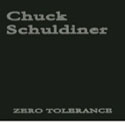
Chuck Schuldiner
Zero Tolerance
Candlelight Records
Packaging, sound quality, thematic consistency – I have to subtract on all counts. The packaging for a band that had such graphically eye-catching album sleeves and shirt designs (tell me, I dare you, that the covers of Leprosy and Spiritual Healing won’t stand the test of time as extreme metal iconography, alongside Slayer’s South of Heaven and Metallica’s Master of Puppets) is a blah white cover with a rudimentary font – c’mon has anyone seen the Death logo recently? It’s a feast for the eyes! – is disappointing. The sound quality for the admittedly thrilling live set from the Spiritual Healing tour (my personal favorite Death era) is total shit, buried under tape hiss and ambient fuzz, and it sounds like the various demos were mastered straight to disc with no touchups whatsoever. The sequencing is terrible, too, as for some reason the Mutilation demo follows the Infernal Death demo; first Kam’s here, then he’s gone and then he’s back again! And the liner notes I was given don’t explain a goddamn thing about who played on what. Sad. I call it a rush-job.
The first four tracks are unreleased instrumental jams from the last rehearsals of Control Denied, Schuldiner’s post-Death, progressive-experimental outfit. Each track is like an audio sketchbook. A virtuoso talent trying to integrate all of his diverse musical passions into a new whole, while still keeping it heavy. Chuck was the king of the technical, yet still raw/vicious riff. The tracks flow according to their own internal logic, snaking through riff after riff; technical sections clash with total brutality and bits of eastern and jazz influence. In fact, the whole thing feels like speed metal meets jazz fusion. I’m thinking Miles Davis and Pat Methany and a deadly serious Mr. Bungle. Similar to his work in Individual Thought Patterns and the like, just completely set free from the demands of the death metal aesthetic. It’s the sound of a quick and restless mind, the sound of evolution and progression. And, if nothing else, it’s pretty great to hear Schuldiner and the drummer just flow/improvise in these formless, unhurried jams. Math rock, prog metal. It’s a fascinating experiment, but…
… it all melts away in the face of the first three seconds of the Infernal Death demo. Infernal Death is everything metal should be, a glorious screaming noise, primitive guitar riffs played at the speed of light, pounding drums buried deep into the distorted mix and the inimitable Kam Lee howling over the top of this feral sludgy punkoid din. This is the sound of a bunch of Central Florida teenagers reinventing the wheel. It is impossible to overstate how influential this demo was, and how a viral network of tape traders soon spread its gory audio sickness (literally) all over the globe. To these ears, it’s every bit as exciting now as it was then. Death could have easily stopped here and been hailed as legends for as long as loudfastrules.
But they didn’t. Chuck kept pushing them forward, aesthetically, thematically, sonically and technically, and much of this early progression can be heard in the demo tracks wherein Lee has been unceremoniously rejected from the vocal seat so that Schuldiner could take center stage as both songwriter and frontman. And to add my two bits as to who is the better Death mainman, I have to say that although Kam Lee gave more blood and vocal chord-flesh to his task than almost any other vocalist in the genre, it’s Schuldiner’s subhuman, from-the-pit-of-hell grunts and screams that truly fit the Death sound. The arrangements get more complex, and the riffs get more catchy yet somehow more evil (thrashwise), though the underlying aggression and speedkicks are still intact. “Zombie Ritual” is a particular highlight of gore-soaked technical expertise. The Scream Bloody Gore songs sound a whole helluva lot better now than when I first heard them. Wow.
Despite the sound quality taking a distressing downturn, the opening notes of “Living Monstrosity” sound like a completely different band. By this point in 1990, Schuldiner was already pushing the death metal genre to its limits with an unholy mélange of grindcore aggression, speed metal acrobatics, progressive song structures and stunning guitar heroics. His rhythm section of Bill Andrews and Terry Butler (who would soon decamp to join fellow Death exiles Kam Lee and Rikk Rozz in Massacre) were solid and powerful and Schuldiner was trading licks with his newest protégé, or should I say prodigy, young gun James Murphy. Furthermore, Schuldiner had largely jettisoned the gore and horror-soaked lyrical themes of the past to address more personal/political concerns in an almost humanistic fashion. Here was a Death that was anti-war, anti-death penalty, venomously opposed to the televangelists that were beamed into his Florida home on seemingly every television station, and in favor of dying with dignity. These complex viewpoints were all somehow communicated in a voice that sounded like the devil himself. This was Death at their apex. The concert has unwitting moment of humor, like after first number “Living Monstrosity”, an unflinching look at abortion, where after his last gutteral scream, Schuldiner drawls, like a total hick, “How y’all doing?” Or when he wishes a concertgoer who spit on his guitar to “rot in hell” in a stoned, polite Southern accent. Most of the setlist is culled from the giant-steps-forward Spiritual Healing and just goes from strength to strength. The track “Spiritual Healing” itself is a leviathan, from the Sabbath-on-steroids intro stomp, whirlwind guitar solos, and incredible neck-snapping chorus and bridges, to an unusually literate attack on fake preachers. Remember him like this.
Candlelight Records: http://www.candlelightrecords.co.uk/












